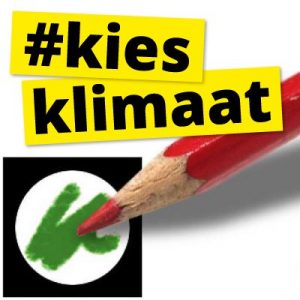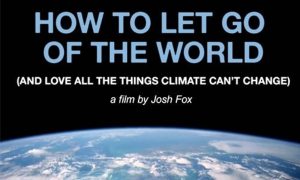How to love the things that climate can’t change (a.k.a. how to fight back)

This is what one might call a belated film review, since the documentary in question first aired in January 2016. It is, however, a belated review that might come just in time. On the road towards the Dutch national elections on March 15, it has become quite clear: if there is a time to vote for a politician that does at least anything against climate change and strives for a sustainable future, it is now.
For me, watching director Josh Fox’ How to let go of the world, and love all the things that climate can’t change,[1] clarified many things, besides my opinion that everybody should watch this film at some point.
How to let go shows Fox travelling around the world to the places where climate change is already visibly having an impact. We see images of a smog-covered city (Beijing), oil exploitation and pollution deep inside the Amazon jungle (Peru and Ecuador), a coastline where the water takes up more and more land on which people used to live (Vanuatu), and the intensity and impact of hurricane Sandy around New York and the rest of the East coast of the USA. The overall message of the first part of the documentary is pretty clear: if the circumstances keep persisting the way they are, extreme weather events like Sandy will increase in intensity over the course of time. Together with the many other possible negative consequences of global warming.
Make it personal
Until now, many climate documentaries, such as Cowspiracy[2] and Before the Flood[3], mainly cover the problems that are at stake on a macro-scale. How to let go zooms in on personal and communal situations of people in different parts of the world and how they are already being affected by climate change. Besides that, it is an active call to action[4], rather than a manifesto to either radically stop doing the things you do (Cowspiracy) or hand the problemacy over to politics (Before The Flood).
At first, the film portrays both Fox and his interviewees as almost apathetic and indifferent. All because of the perceived impossibility to diminish the increase in the earth’s temperature in time. Later on however, positivity starts to grow, people start to fight back and the influence one can have as an individual is emphasized more effectively. An example is the singing and yelling protests from Vanuatu residents against Australian police boats when large coal ships are leaving the Australian port of Newcastle. This all happens in wooden canoes that – unsurprisingly – do not stand a chance against the steel and armoured ships and police boats.
In the process, Fox’ humorous narrating (“This was the moment where I decided to just watch a cat video.”) does its job as well. It gives the whole documentary a rather light-hearted atmosphere. At the same time this is a bit ambiguous, since the problemacy it deals with is serious to say the least. Besides that, Fox underlines the idea of ‘letting go’, while at the same time he states that doing nothing is not an option. And that is not to mention that the ‘comedy’ takes away the attention from the fact that what we are dealing with is not something we should be laughing about.
Climate politics
 Climate change is long gone from only being a problem in countries where people are already migrating away from, to eventually get to Europe or North America. Hurricane Sandy for example, was the heaviest storm ever to have hit the American East coast. Simultaneously, if it is not our crops that are being destroyed, they will be destroyed in countries with a less favourable geography. In the end, this will only intensify the northbound refugee streams that many European politicians are already calling too big right now.
Climate change is long gone from only being a problem in countries where people are already migrating away from, to eventually get to Europe or North America. Hurricane Sandy for example, was the heaviest storm ever to have hit the American East coast. Simultaneously, if it is not our crops that are being destroyed, they will be destroyed in countries with a less favourable geography. In the end, this will only intensify the northbound refugee streams that many European politicians are already calling too big right now.
One may therefore call this article a political outcry and a well-timed film review at the same time. Nobody is exaggerating when saying that climate change has become the most precarious problemacy of the moment. Next to worldwide displacement of people and settlements, it will have an impact on human health and potentially initiate new economic crises. Considering How to let go, I cannot help but fully agree with Josh Fox: you have a choice to not let it come as far as the doom scenarios.
And this choice has now become more relevant than it has ever been. Because if there is a time to vote for green politics, it is now. If you are Dutch and/or have the right to vote in The Netherlands, do take the time to read these two articles[5] [6] that explain which parties have the policies that are most pro-climate.
But this “outcry” not only applies to The Netherlands, where the national elections take place tomorrow. Also for France and Germany where the people will vote later this year, and for the rest of the world, the importance of this transition should be of everyone’s interest.
Choose what you wish, that is in the first place your right. But rather than engaging in short-term symptom-battling rhetoric, at the very least: choose for a sustainable, climate-friendly and long-term oriented political future.
[1] http://www.howtoletgomovie.com/
[2] http://www.cowspiracy.com/
[3] https://www.beforetheflood.com/
[4] http://www.ecowatch.com/7-things-you-should-do-after-watching-how-to-let-go-of-the-world-1891184937.html
[5] https://decorrespondent.nl/6353/dit-zijn-de-partijen-die-klimaatverandering-serieus-tegengaan/700157777-a3614274
[6] https://decorrespondent.nl/6381/denk-nog-3-minuten-na-voordat-je-stemt-en-kies-dan-voor-radicale-klimaatactie/778637887830-129a21fa

